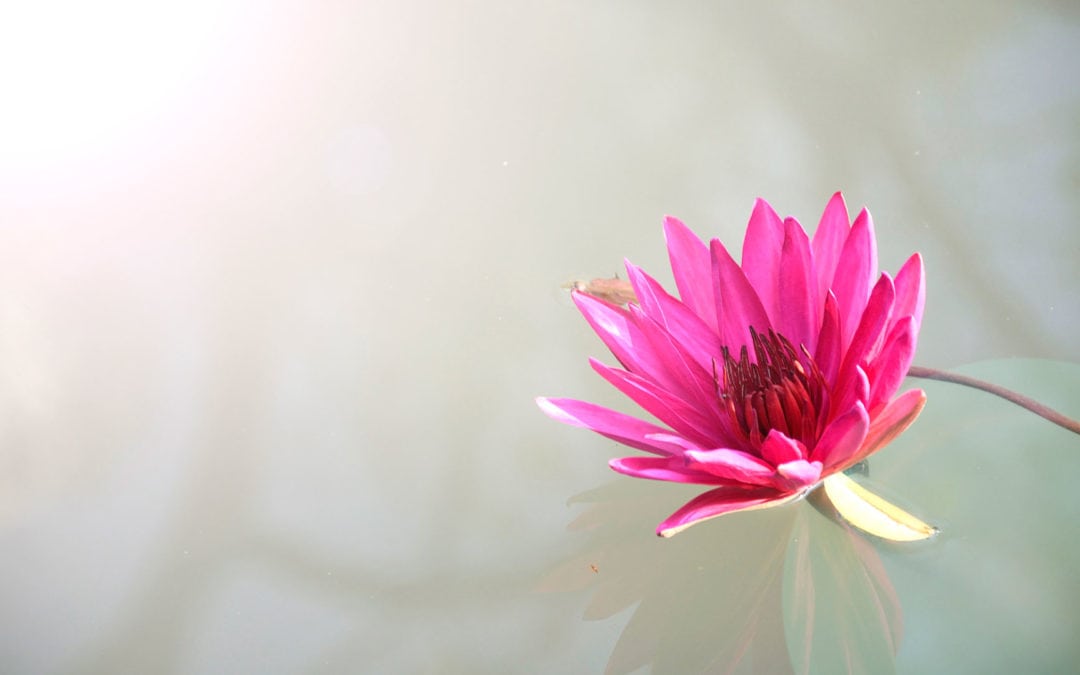
by Maribeth | Feb 24, 2018 | Recipes
Ayurveda is a mind-body health system developed thousands of years ago by Indian sages. It is a science of life (Ayur=life; Veda=science or knowledge) that is more than a system for treating illness. Rather, it focuses on expanding personal awareness, bringing it into balance, and then extending that balance to the body.
According to Ayurvedic philosophy the mind and body are intextricably connected. Because of this deep connection, nothing has more power to heal the body than the mind.
For example, when you meditate you are using your awareness to restore balance in your mind and (since the mind and body are inseparable) that balance spreads to your body. Your heart and breath rate slow, your body decreases the production of stress hormones, and you increase the production of neurotransmitters than enhance wellbeing. This means you literally have the ability to change the functioning of your body in a healthy way!
Ayurveda offers many practices for expanding self awareness and inner balance. Here are a few of them that you might consider incorporating into your life:
Identify and understand your unique mind-body type.
Ayurveda is a personalized approach to health. Knowing your mind-body type can guide you to make the right choices for diet, exercise, supplements, and all other aspects of your lifestyle.
Eat a colorful, flavorful diet.
Foods that are blue, purple, red, green, or orange are plentiful in antioxidants and nutrients that enhance immunity and health. To enure that you are getting a balanced diet, it is also recommended that you include the six Ayurvedic tastes in each meal: sweet, salty, sour, pungent, bitter, and astringent.
Get enough restful sleep.
When we sleep, our body is repairing and rejuvinating itself. To support your body, it is recommended that you get between six to eight hours of un-aided, restful sleep each night. If you wake up feeling energetic and vibrant, you know you had a restful night’s sleep.
Live in tune with nature.
What you need and what you want should not be in conflict. When you are in balance, you desire the things that nurture your health and life in a positive way. You focus on what you need in order to stay in harmony with your body and mind.
Tune into your body.
Tune into the messages your body sends you. Pay attention to your comforts and discomforts, to how your body feels. Consider what choices you should make, based on what your body is telling you.
Strengthen your digestion.
When the body is able to regularly and completely digest the nutritional, emotional, and sensory information it takes in, it is happy and healthy. Good digestion improves perception, physical strength, and immunity and creates feelings of vitality.
Just be.
Do not waste your energy by struggling or trying to force things to go your way. Let love motivate your actions. When you let love guide the way your energy will expand and you will have more of it.
Join your friends at Inlet Yoga for the “Ayurveda: It’s Time to Spring Clean!” workshop on March 17, 2018.
Click here to register.

by Maribeth | Feb 4, 2018 | Recipes
Valentine’s Day is a time to celebrate ALL things love, including yourself. Self-care and self-love are important to your overall well-being. This Valentine’s Day, take time to nurture your heart and become your own valentine. Here are some suggestions for cultivating self-love:
Develop Mindfulness
Be connected to what you feel, think and want. Pay attention to your self-talk. What effect is your self-talk having on your overall well-being, mood, health and behavior. Is it helpful? How can you modify your self-talk so that it represents the real you, not the expectations others put onto you?
Practice Self-Care
Set the foundation for growth and authenticity by commiting to activities that are healthy for you; nutrition, exercise, enough sleep and rest, social interactions, and fun.
Forgive Yourself
Take responsibility for your actions, but remember to learn and grow from mistakes rather than punishing yourself. Look at a mistake as a lesson to be learned and use that lesson to heighten your awareness in the future. Practice self-compassion when you make mistakes.
Set Boundaries
When you are feeling stressed, inflamed, or down, consider what might be the cause. Set limits and say no to those people and situations that harm you physically, emotionally, or spiritually. Taking a break can give you the space you need to decide what it is you do want in your life, or what is healthy for you.
Live Intentionally
Consider the purpose and meaning of your life. Set your intention and make decisions and take actions that support that intention. When you are actively engaged with fulfulling your higher purpose, you make choices that align with your true Self.
If you practice cultivating self-love as often as you can, eventually it will become second nature. Practice and celebrate yourself this Valentine’s Day; you are worth it!
Open your heart with grace and acceptance at a Heart Opening Workshop with Maribeth MacKenzie.
Click here to sign up.

by Maribeth | Jan 8, 2018 | Recipes
Transitioning to a new year provides an opportunity to reevaluate the many areas that make up your life. It is a time to ask yourself, “Who am I? What do I want?” Consider the following as you welcome the New Year:
Release the Old to Make Room for the New
Resolve any issues you might be holding onto from the previous year. Quickly recap the main events and notice any time you get stuck or feel an emotional charge. Consciously accept what is causing these emotions and then leave it in the past; accept that it has already happened and therefore cannot be changed. Work on learning the lessons and forgiving, so you can make space for new experiences. As T.S. Elliot wrote, “Last year’s words belong to last year’s language and next year’s words await another voice.”
Ask Yourself, “What is My Deepest Desire?”
Sit quietly with your eyes closed and focus on your heart chakra. Take a few deep breaths. As you do, consider the following questions: “What is My Deepest Desire? What do I really want? What is my purpose? How can I serve?” Ask the questions and pause. Listen to whatever answers naturally arise, without evaluating or judging. Write down your answers, again without evaluating or judging. Throughout the week re-visit your writing and reflect, in time making your desires as specific as you can. Choose two or three of your answers and create a sentence about them.
Repeat Your Desire
Memorize and silently repeat your sentence. Do this daily in a quiet and calm space. Plant the seed and as you do, let go of any attachment you might feel to the outcome. Let go and let the Universe handle the details.
Feel free to repeat this process as the year progresses. Dare to dream, let go and enjoy yourself!
Join your friends at Inlet Yoga for a Heart Opening Workshop to focus on opening your heart with grace and ease, to let go of the old and let in the new. Click Here to sign up.

by Maribeth | Dec 9, 2017 | Recipes
It is easy to get distracted during the holiday season. Nostalgia kicks in and the mind drifts to memories of the past. In the next moment it moves to the future as it wonders how this year will unfold. It compares your seasonal festivities to others on social media. It can get carried away with gift ideas, food ideas, and challenging family dynamics. Pressure to spend money, time and energy on the things that society seems to value can leave you feeling exhausted. Before you know it, the season is behind you and you are not sure quite where it went.
Rather than letting your mind focus on holiday expectations, give your family and friends, and most of all yourself, the best gift of all; your presence.
Here are some ways to bring yourself back to the now:
1. Simply Observe
Disconnect from technology and make time to simply observe what is going on around you. People watch, or go outside and watch what is happening in nature. Doing this with a loving, inquisitive heart can teach you about culture, mannerisms, customs and the natural world. Allow yourself the time to feel grateful for the environment that surrounds you.
2. Listen Attentively
When someone is talking to you, pay close attention to their tone of voice, inflection, and body language. Be mindful and inquisitive of your own reactions and body language as they are speaking to you. If you find your mind wandering as it begins to formulate a response, bring it back to the present moment and pay attention. Focus on listening rather than speaking.
3. Delight in Magic Moments
We often delight in major moments, like weddings, baby showers, and birthday parties. However, most of life’s most magical moments are little and happen every day. Staying present will help you notice these moments when they arise. It’s when your child looks you in the eye and says, “I love you.” It’s when your spouse or partner cooks dinner for you. It’s when you get a holiday card from someone you have not seen in a while. It’s catching a beautiful sunset or seeing twinkling festive lights as you drive down the road.
Staying present allows us to notice the wonder that surrounds us; the suprise, the mystery, the love, the joy. This is really what the holiday season is about.
None of this costs money, none of it causes stress. All you have to do is be mindful of staying present. It is likely you will find that when you do, others will too. There is no better gift to give and receive this holiday season than attention, gratitude, and love; the gift of presence.

by Maribeth | Nov 5, 2017 | Recipes
Gratitude is a key way to turn negative thoughts into positive ones. Changing thought patterns through practicing gratitude can impact the physical, psychological and social aspects of a person’s well-being.
There are challenges to gratitude like narcissism, materialism and over-scheduling. Therefore, it is important to mindfully and consistently practice gratitude, much like meditation. You can practice gratitude by finding ways to verbalize, write it down, or share through social media; gratitude works best when it is shared.
Here are three ways to quickly practice the art of being grateful:
- Keep a Gratitude Journal: At the end of your day, write down at least three things that you are grateful for. This can be as simple as feeling grateful for being able to easily obtain clean water through a faucet, or for the people who take your garbage away each week (Imagine if no one came to get it!).
- Write a Gratitude Letter: Write a letter of thanks to someone who has positively impacted your life. Explain how they impacted your life-be sure to be specific and descriptive when you write. You can choose whether or not to mail the letter. Either way, you will receive the benefits of gratitude.
- Receive Gratefully: Be mindful and accepting when other people pay you compliments, or when you do something to be proud of. Recognize and accept the good feelings that result.
Practicing gratitude is essential for happiness. If you set your intentions for gratitude each day, eventually gratitude will be your attitude!





